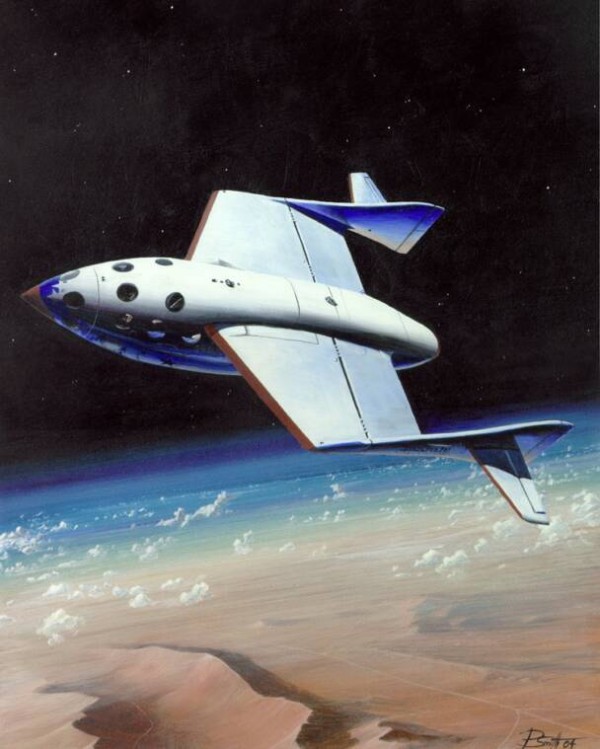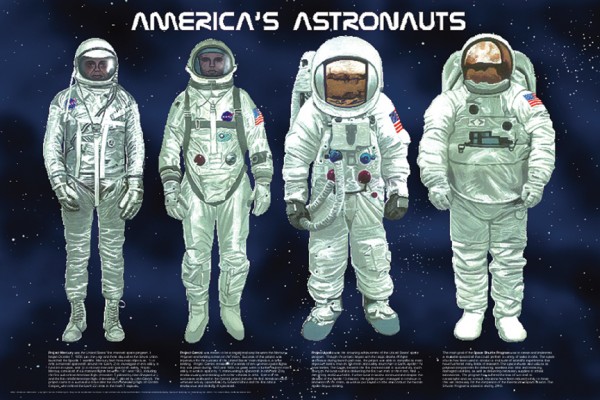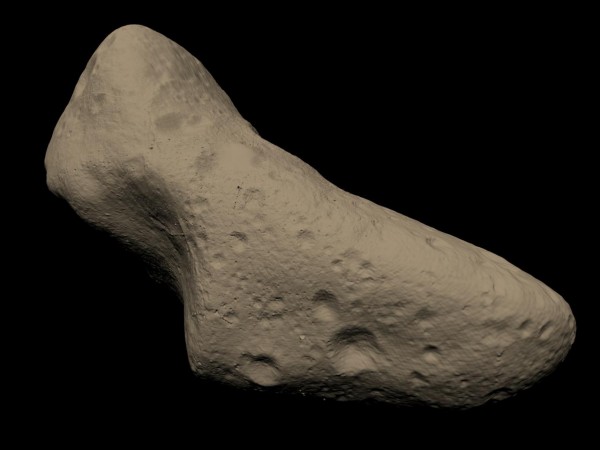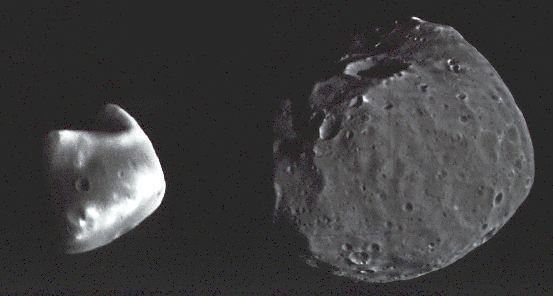I believe that this nation should commit itself to achieving the goal, before this decade is out, of landing a man on the Moon and returning him safely to Earth.
-John F. Kennedy, 1961
The entire human endeavor of spaceflight is -- without a doubt -- one of the greatest achievements in the history of humanity. Looking up into the heavens certainly provides some spectacular sights and a huge amount of insight into how space, stars, and galaxies work, among a myriad of other things. (And click the image below for an amazing high-resolution version.)

But my two biggest complaints about the space program of late have been its failure to spark excitement among the general public as it did in the 1960s, and its inability to excite the commercial sector in terms of investment purposes.
Which of course begs the questions, how do we excite the public the same way proposing putting a man on the Moon did in 1961, and how do we get private companies involved to help with this tremendous effort?

The first question has an easy answer. (Especially if you've ever seen Total Recall.) It's Mars! The big problems with mission plans to Mars, historically, is that they've required all of the following:
- huge leaps in technology,
- massive increases in funding which do not materialize, and
- a singular, continued vision over a timespan of many decades.
So when I read the transcript of Obama's speech yesterday, where he laid out in broad strokes his vision for the future of our endeavors in space, I was initially skeptical. After all, a soundbite like this is only too familiar to me coming out of a President's mouth.
By the mid-2030s, I believe we can send humans to orbit Mars and return them safely to Earth. And a landing on Mars will follow. And I expect to be around to see it.
But -- despite the fact that this is the main message that has made it into popular media -- this is not the main crux of Obama's proposal. This is only the long-term vision he has in mind. Instead, his proposal (which you can download a summary of here) consists of these major points:
- The behemoth nightmare that was Constellation is out. The best parts of it, like the Orion Crew Capsule, will have their developments restructured to better suit our needs.
- The ISS will live! Not only does the plan include keeping the International Space Station around into the 2020s, but NASA will increase the total number of astronaut-hours in space by over 80,000 over the next decade.
- The shuttle will, indeed, be retired. What will replace it, if not Constellation? A combination of two things. To get astronauts up into space, a new commercial space transportation industry will be jump-started, creating an estimated 10,000 jobs over the next 5 years.
- But what of heavy payload lifting? That responsibility will fall on NASA, on a timetable that will actually be two years ahead of Constellation. Over the next five years, NASA will spend over $3 billion on R&D for new technologies to lift heavy loads into space. And perhaps most importantly,
- NASA's budget is being sizably increased to accomplish these new goals. By a lot. How much is a lot? By six billion dollars over the next five years. In other words, unlike the Bush plan, these new NASA endeavors don't mean cutting basic research; their funding is being increased to cover the costs of these new proposals!
I am over the Moon about this!

(Figuratively.) Other people have their critiques and their own takes on it, and -- here's the big caveat -- if all of this comes to fruition, we will be able to meet the loftier, long-term goals.

The investment in commercial space travel is the huge change that I'm completely in support of. For far too long, NASA has been the only game in town (okay, NASA and Russia) to put humans into space. All the while, things like SpaceShip One, the Ansari X-Prize, and Branson's Virgin Galactic have been generating more excitement than NASA about manned spaceflight! I think this is hugely overdue, and should lead to perhaps the most exciting new type of job one can imagine, the commercial astronaut!

Next, we come to the development of new technologies in heavy payload lifting. The Constellation program, for all the hoopla surrounding it, offered practically no advantages over the ancient Saturn V rocket programme. The call and commitment (especially the monetary commitment) to develop a new heavy-lift method should be hugely profitable in terms of aerospace and aeronautics development, as this has historically always been the case.
So what's Obama's exciting intermediate goal?

Missions to asteroids! This is done under the pretense of protecting Earth from possible future catastrophic collisions. It's a worthy goal, even if it's an unlikely event in the near-term (next thousand years) future. Why is it still a worthy goal? Because we will achieve the following:
- We will send humans out farther into space than ever before, and bring them back!
- We will land on the first bodies not gravitationally bound to us, and
- that exert no notable gravitational force on their own! And finally,
- if we're lucky, we will find some very rare elements in abundance on these asteroids, providing a possible commercial benefit!
Going to space to mine asteroids, can you imagine?! You can read more about the asteroid mission here.
Of course, you have to ask yourself, is there a downside to this new vision? Of course there is.

The return to the Moon is getting scrapped. Some are extremely disappointed by this. I'm not. Why not?
Yes, we need to figure out how to survive in space for long periods of time, but to my mind, being on the Moon is no better than being on the ISS! Hell, it's no better than being on Mir, for that matter. The vision for multi-hundred day missions on a round-trip to an asteroid -- even a near-Earth asteroid -- should give us a huge handle on how to do that.
This practice also gives us an added bonus that no one's talking about. Recognize these objects?

They look an awful lot like asteroids, don't they? That's because Mars' two moons, Deimos and Phobos (above), are probably captured asteroids! If we can land on a near-Earth asteroid and return to Earth, there's no reason why the next step wouldn't be to land on one of Mars' Moons, slingshot back around Mars, and return to Earth! Going to the Moon would only be an important goal if we had long-term plans to establish a permanently manned base on Mars, and frankly, I don't think that needs to be in the cards for the first pioneers.
So that's our new space vision in a nutshell, and I am stoked about it, as it's a huge improvement over what we have now. If it goes as planned. What do you think?

I think that we need to learn to live in harmony with our own planet before we go metastasizing to the rest of the solar system.
I'm not worried about the money. Six billion more or less for NASA to literally throw off the planet is pocket change, in the long run. The real problem with the science-fiction "vision" of traveling to other planets is twofold.
First, it promulgates the dangerous lie that there are alternatives to living on Earth; that if we (human beings) wreck our planet, we can (in the long run) just spread out to the moon, or Mars, or the asteroids, or so on.
Second, the 'vision' of manned exploitation of outer space (as promulgated to American audiences) is simply an updated version of Manifest Destiny, the 'American Dream' of constant expansion. More room to grow. More resources to burn. More and higher-tech devices to consume those resources. And that, as well, is a tremendously dangerous memetic virus. We're living in a time when the technology-driven damage to our planet is reaching a critical mass. We need to simplify. Use fewer resources. Use less technology. Remake our society into one which condemns, not cheers, wasteful consumption. Obama's "Outward Bound" project is the exact opposite of what we need to be doing as a species.
Some excellent perspectives, and appreciate your drawing the parallels between local asteroids and the moons of Mars. Getting to orbit, whether Low Earth Orbit or a lotfier one, we will be, as they say, 'half way to anywhere'. Getting there using the current approach to rocket technology is the stumbling block, it seems. No matter what we do, the current approach towards rocket design is just not the way to get the mass of propellant and other massive bulky payloads up there, and trying to refine the current designs so that they squeeze more out of 'em or make the procedure less complex still leaves us with outrageously expensive costs...and it will always be somewhat expensive since it takes lots of energy to get to space, but the fact is that it doesn't cost ten times as much to launch ten time as much using a rocket ten times as big. The legacy of NASA rocket development is that they are derived from already designed IBMs from the cold war defense program and were what we already had when Kennedy made it a national goal to go to the moon. Those rockets were the only game in town at the time, and they worked, but it wasn't always supposed to be like that. We were supposed to build big sole purpose space ships and we would have the equivalent of the Ammundsen-Scott South Pole Sation, but in a geosynchronous orbit. If funding wasn't limited, and leadership shortsighted, maybe we would have had Robert Truax's design for the SeaDragon lifting into orbit the structures and consumable cargoes that a fully functional and permanent space platform would entail including adequate shielding and the ability to rotate and generate the simulated gravity we need for long duration projects and crews. It's still an eminently practical way to get there, and I hope one of the things NASA and commercial interests come to realize, while still using as a rung on a ladder the current generation of technology as we transit toward the real business of space exploration.
I'm ecstatic. Now if Space X, Blue Origin, and ULA can start providing a market not just to NASA and the Air Force but to Virgin and whomever else then we can make the breakthroughs to get to Mars. We'll never get their with cost-plus contracts.
Our technology is finally catching up to our imagination (needs) such as maneuverability in space. The shuttle was such a bus, it was one hell of a feat just to dock or do a 180. Full mobility in space will be the result of the greed impetus that unfortunately is used as the drive mechanism for the advancement of humanity.
I don't think we are too far away from ditching the massive rocket engines to punch payloads through the spheres into space, or the hell fire of reentry, just as we will abandon the barbaric burning of fossil fuels in the next (x) years by invention or necessity.It was needed to arrive at today's point of evelution. Each technology that is developed has the potential to destroy yet if used wisely and timly we will make it.We are in a sense forced to progress by limited resources.We must not allow a depletion of any source before we move on to the next. Yes,yes I know what it takes to escape the mass of earth, but gravity isn't the only variable involved.
Suffice it to say that the merging of many differing science disaplines may be the answer to this one.
I totaly agree with "mad the swine" in comment one, yet I do realise that progress made in the pursuit of space exploration will be needed to answer our earthly woes.
And our earthly woes must be addressed with actions...not words.We seem to be locked in a pattern of progress or go back, and if we screw up the earth in the process their is no going back.
Good points. I think visioning is important at this phase because visioning can help make sure resources are used for the goals which will actually provide the most benefit to the human species, as well as define those goals so we don't chase after the "constellation" prizes (OK - bad pun!)
First, big thrust rockets are not the future. More efficient, less dangerous propulsion systems must be designed.
Second, I disagree about not returning to the moon. Colonizing the moon does excite people. if you think Disney World is popular, I'd say bump it up at least one order of magnitude if we had a real, functional moon colony that tourists could spend a few days at.
Third, I agree with the idea that we need to redesign the technology to be less wasteful. Right now, we are polluting up earth-orbit space in exactly the same way we polluted up our oceans on Earth. The idea should not be to merely expand into spoace, but to learn how to live cleanly and efficiently in space.
Fourth, I like to return to the old type I - type IV civilizations scale. As Michio Kaku points out, we are at type zero (surviving by cannibalizing the resources of our own planet, which is unsustainable by definition). Therefore, a worthy goal for humanity would be how to transform into a type I civilization (can harness the energy of a local star) thereby ensuring survival for at least the lifetime of our Sun.
Along those lines, launching space stations whose primary goal is to develop ever more efficient and cleaner ways to harness the Sun's energy should get high priority. Obviously, this will have profound benefit for terrestrial energy applications, thereby providing lucrative incentives for corporations to develop clean solar technologies and market them here on the ground as well.
Researching asteroids is important as well, for they will teach us the building blocks of the solar system. Also, harnessed asteroids cvan provide minerals and other resources.
Colonizing the moon would be the first step to colonizing any other planet. It is turning out that there is a lot more water on the moon than previously thought, for example, so efficient and clean technologies for using and recycling water on the moon could be crucial breakthroughs for allowing us to colonize the moon.
Beyond that, we know that there are worlds out there, even in our solar system, with liquid water oceans, and I think in coming centuries they would be prime targets for us to branch out from what we have learned from colonizing the moon.
So I think the primary question we should be attacking with space exploration is "how do we transform into a Type I civilization?" That will direct us to learn how to harness the sun's energy and colonize our solar system.
I think that's a very exciting goal which will also spawn new energy technologies and new economic advancements for our civilization.
I want to see more research done on VASMIR drive. Yes, heavy lift to get into orbit but once there I recall reading that a VASMIR drive craft could reach Mars in 39 days.
That would be well worthwhile. And in my estimation completely possible within a 5 year time span.
First I have to say that, as ever, "if" is the biggest and most nebulous word in the whole equation. I seriously hope the ifs can be surmounted.
I agree that going to asteroids is quite likely our best next step as well, though I'd like to tweak the reasoning just a tad. Ethan mentioned commercial benefits from finding rare compounds - just as important are the common compounds! For one thing, how much less of an impact on our environment it would be if we didn't even have to mine iron or nickel from the planet anymore! For another, it seems that we're starting to run low on some of the common things, or at the very least, running low on the easily and cheaply obtained amounts we've been mostly utilizing thus far, so getting a few tons of iron out of really thin air would certainly be commercially beneficial. Though of course getting lucky and finding a large amount of rare elements would be amazingly useful as well.
As for the whole idea of space travel/exploration being a commercial venture, all I have to say is shame on the human species for taking so bloody long... (Not that I don't understand some of the reasons WHY it took so long, I'm just aghast at the situation.)
Overall, I'm pretty happy with this new plan, but the space geek in me of course wishes it did even more...
mad the swine: I actually see your two reasons as being pretty much the same reason, that the Manifest Destiny you mentioned isn't really so much an american thing as it is perhaps a human thing (or maybe just the European cultures). That we've always kept expanding into ever newer areas BECAUSE we've wrecked our environment, though over most of history the wreckage was perhaps as much social/political as environmental. For a very long time there always WAS newer areas to explore and exploit. I even agree with you that this is not a good thing and is something we need to confront within ourselves if we take seriously the notion of bettering our lot. BUT at this late stage, we don't really have any other choice. You say we need to simplify and use less technology, but I really don't see that happening. Look back at history and see how often we've abandoned a genuinely useful tool or knowledge. (Abandoned as opposed to improved upon and upgraded.) While not exactly an historian, I can't really think of anything. Maybe that too is something we need to work on, but I don't think so. I say that from the perspective of having my own notion of where I'd like to see the species go in the far future and it does NOT involve an extended period of enforced ignorance. (I say enforced ignorance because once we get a new tool, we USE it and things would start all over again, unless some other element enforced that lack of knowledge.) Even if I DID think that was the way to go, there isn't enough time before a critical mass of OOPS hits us in the face for such a tactic to actually be effective. (Though those that actually wish for something like 95% of the human population to be wiped out probably wouldn't care - on my more cynical days, I can sympathize.) So we need technology to help us, as it's always done, and we need more resources for that and the best place to get those resources is out yonder. But we really should already have been doing this for 20+ years...
"NASA will increase the total number of astronaut-hours in space by over 80,000 over the next decade"
Why? To do more cutting edge science?
/sarcasm
HLV WON'T be ready by 2015, an OPTION will be ready by 2015, meaning it will take another 5 or so years to construct, given NASA's reputation, it could be longer. Obama said by 2025 the technology will be ready for a trip to an asteroid, he never stated we will land on one by 2025. The dates are very abstract.
As for the Moon, there is so much left to do on the Moon. To completely fly over it is a mistake when there is so much scientific and economic value. We landed on the Moon 6 times and brought back some rocks. I think too many people are underestimating the value of a possible return to the Moon.
Now, don't get me wrong, I WANT to land on an asteroid. I think that prospect is exciting and a step forward in human space exploration.
Over the last few years, I've found myself developing a real fondness and affection for our plucky little robot explorers. Spirit, Opportunity, Hi-RISE, Cassini, Chandrayan, all of 'em -- I love those guys. It almost seems a shame to turn over exploration of the solar system to sweaty meatbags with a profit motive.
Will the ISS ever be used for - what's that thing again? Oh yeah, science. I was hoping this one instrument could be put on board with a permanent view of the earth, but that never happened. I jokingly offered to take the instrument and was told in too serious a tone that I could have it for $5M.
5 years to develop new technology for heavy lifters? Even with today's mechanical design and simulation software I doubt that can be done. "New technology" invariably requires some experimentation and no guarantee of success.
Capsules do not magically fit onto rockets; they have to attach somehow. Will rockets be designed to attach to Orion, or will the interface segment of Orion be postponed until there is a candidate rocket? (There is Ariane 5, but there is always a lot of resistance to working with a foreign launch provider.)
What do you mean by a commercial space transport industry? Commercial corporations like Boeing and Lockheed managing everything from preparation of the launch vehicle to all the launch procedures etc? Private corporations already do most of that work. In the EU it is a private company that does all that work (EADS). Of course some companies aimed at space tourism would love to make a little extra money by providing services to NASA, but I wouldn't get terribly excited about them actually being able to do anything until they do prove their capabilities. At the moment these companies seem to be capable of sub-orbital launches at best or perhaps they can even launch a microsatellite into low earth orbit. The launch failure rate is in dire need of improvement though - especially if they want to claim to be able to send humans into space in one piece and retrieve them in one piece. I still have reservations about the theory that strapping 9 dud motors together will produce one huge successful motor; N1 comes to mind: http://en.wikipedia.org/wiki/N1_(rocket)
Ethan, when asking "how do we excite the public the same way proposing putting a man on the Moon did in 1961", do not forget the most important, and nearly only, reason: the rivalry with the Soviet Union. I'm old enough (and, by the way, lived the greater part of my life near the Iron Curtain) to remember very well how easy it was to excite the public in the U.S.A. and in the free part of Europe by addressing this topic. If we want to excite the public again, we need something equivalent.
And "how do we get private companies involved to help with this tremendous effort?" They were *paid* "then", and they had the opportunity to show their patriotism. Now we will need money again, and, because of the economic crisis there will not be very much *public* money, business opportunities. Nowadays: It's the economy, stupid!
Will the public be excited again? Will there be enough public money? Will there be a lot of business opportunities? I think, no, no, and no.
I'm with HP at comment #10.
I'm all for spending billions of dollars for meatbag space tourism if I get to be the meatbag who goes.
But aside from that selfishness, I'd much rather we send robots. They don't eat or sleep or mow the lawn, they just (modify original South Park song here) take data while holding their breath and surviving high radiation levels. And they won't contaminate the surface Mars with earth biology.
I also don't understand your excitement about maintaining the ISS. How is it anything but a big zero in terms of either science-on-the-dollar OR performance art?
I'm all for working on propulsion technology (and reviving manned exploration if and when those breakthroughs make it make sense) but putting humans in space doesn't strike me as a worthwhile goal in and of itself until propulsion technology makes it more viable.
Hope NASA increases their budget for more flavors of space ice cream. Getting tired of eating Neopolitan....
poop
definatly a very interesting perspective on things but i do think everyone here is missing the big picture
they have recently discovered what is called the god particle
now im no expert on religion nor do i believe most of that crap
but from my understanding the god particle will be used by evil to bring demons and the devil into our world
wether or not you are a sceptic you should seriously consider the fact that these things that are only supposed to be myth may actually be real and part of nostradomus predictions states that these events would happen and that they are very very bad